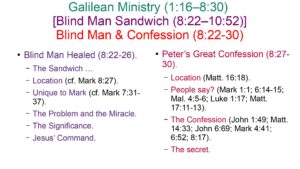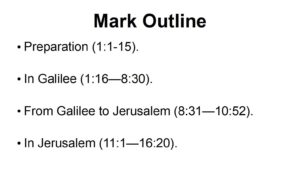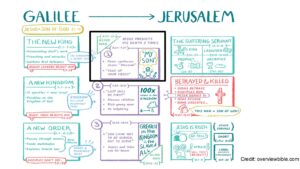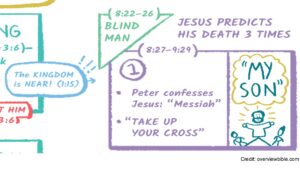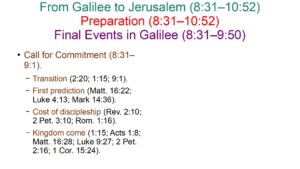The Ministry of Jesus in Galilee
Mark 1:16–8:30
A New King (1:16–3:6).
Kingdom is Near (1:15)
Popularity (1:16-45).
Conflict (2:1—3:6).
Jewish Leaders Reject Him (3:6)
A New Kingdom (3:7—6:6)
Kingdom Has Small Beginnings (4:3)
Continued Conflict (3:7-35).
Parables (4:1-34).
Identity (4:36—6:6).
Jesus’ Town Rejects Him (6:6)
A New Order (6:7—8:21)
Beware of Herod & Pharisees (8:15)
Confession (6:7—8:21).
Disciples Don’t See (8:18)
Blind Man Sandwich (8:22–10:52).
Peter’s Great Confession (8:27-30).
Location – Caesarea Philippi.
People say?
Jesus finally asks the all-important question, making it more personal.
This is the climax of this section of Mark, what all that’s happened has been building to—an average group of people recognizing Jesus.
It is unclear whether or not they all believed this before this confession.
John mentions Nathanael in John 1:49.
Matthew and John record that sometime after the feeding of the 5000 and the walking on water, they made a similar confession (Matt. 14:33; John 6:69).
But there are also expressions of disbelief or doubt that we see throughout the gospel accounts up to this point: calming the storm (Mark 4:41), having a hardened heart after walking on water (Mark 6:52), and just not getting it even after the feeding of the 4000 (Mark 8:17).
So it is evident that their belief waxed and waned over the years—despite their confession after Jesus walked on the water (Matt. 14:33), their hearts were still hardened (Mark 6:52).
How is it possible that their faith seemed to vacillate? How could they make an earlier confession with hardened hearts? Do people do that today? Could their hearts still be hardened? We’ll see later that it still was.
Jesus needed them to get this before He began the next leg of His ministry: His march to the cross.
Even though they wouldn’t fully understand until His resurrection and at Pentecost, they still needed to “see men like trees, walking.”
The secret.
He orders His disciples to tell no one of their confession.
We’ve talked about this before, but this might be the first time it’s actually followed—though to be fair, we don’t know about the blind man who was healed just previously.
At this juncture, what is even the point of trying to keep it secret?
Perhaps fewer people would believe Him if His disciples began making grandiose claims. Perhaps the answers are the same as before: there was still more for Him to do before His enemies tried more earnestly to kill Him. Perhaps He wanted to avoid being made an earthly king again.
We note that the disciples misunderstood the purpose of the coming of the Messiah even as quickly as the next few verses and as late as Acts 1.
Whatever the case it was not His time to be revealed yet—but soon!
Jesus from Galilee to Jerusalem
Mark 8:31–10:52
Preparation
First Prediction of Death and Resurrection (8:31).
The Kingdom is Near (1:15; 9:1)
Final Events in Galilee (8:31–9:50).

Call for Commitment (8:31–9:1).
Transition.
Here is the transition point between Jesus’ ministry in Galilee and the beginning of His journey to Jerusalem.
He is still in Galilee (or in the northern parts of Palestine) for a little while longer.
But we note His eyes now are set to Jerusalem and what is going to be happening there.
We read of the first of His crucifixion and resurrection predictions.
There was one previous, but it was vague and likely not understood (2:20).
Now His focus is on the cross and preparing Himself and His disciples for it.
We also see a transition moving us more toward the suffering part of the suffering servant. Before He was a servant, oft beleaguered, helping and healing others. But now He foretells that He will suffer even more, and we see He does not perform as many miracles.

There are only three more specific miracles recorded in Mark, two in this section, and only the disciples saw the third in Mark 11.
Overview Bible divides this section up into three parts, and connects them to the three parts in the first section.
In this first part, connected with the first prediction, Peter makes his great confession and Jesus relates the cost of discipleship—we also note the Transfiguration is here.
This is connected to the idea of the kingdom coming—as it was stated (perhaps summarized) when Jesus began His ministry (1:15), a greater emphasis is given here (9:1).
What was the common conception of the Messiah that the Jews had at this time (and many still do)? It was of a conquering Messiah, one who would restore their kingdom, bringing them to their rightful place as God’s people.
After Peter’s confession, we note that the disciples recognized Jesus as that Messiah (the Christ).
So how then could He suffer, be rejected, and killed? This did not fit into Peter’s idea of who the Christ was supposed to be—this wouldn’t meet His expectations. How often do expectations meet reality?
Jesus spoke this openly to His disciples, but Peter takes Jesus aside, away from the other disciples, and told Him this wasn’t going to happen (Matt. 16:22).
Have you ever spoken to a friend who was suffering and in pain, who thinks he is dying, and he wants to share some last things with you? What might you say? “Hey now, don’t talk that way. You’ll get through this.”
That may be the attitude that Peter is expressing here, not wanting His friend and the Man he now identifies as the Christ to suffer and die.
Do you remember when Satan tempted Jesus in the wilderness? Do you remember when Luke records the ominous phrase: “[the devil] departed from Him until an opportune time”? (Luke 4:13).
As we’ll note later, Jesus wanted nothing more than to escape what He knew had to happen (Mark 14:36). Satan had offered Him an out those few years before, and now, through Peter, he was offering it again.
That’s not to suggest Peter was demon-possessed, but his heart was hardened and he only saw as the blind man did in Mark 8:24, “men like trees walking.”
Jesusthen looks at His disciples, perhaps thinking of the love He has for them, knowing that He needs to die for them and all others who would believe on His name through their word.
So Jesus rebukes Peter, calling Him Satan. Perhaps not literally Satan, but that Peter was tempting Him as Satan tempted Him.
And He told Peter that he was not looking at things from God’s perspective, caring more for the temporal (suffering/death) than for the eternal (victory/eternal life).
